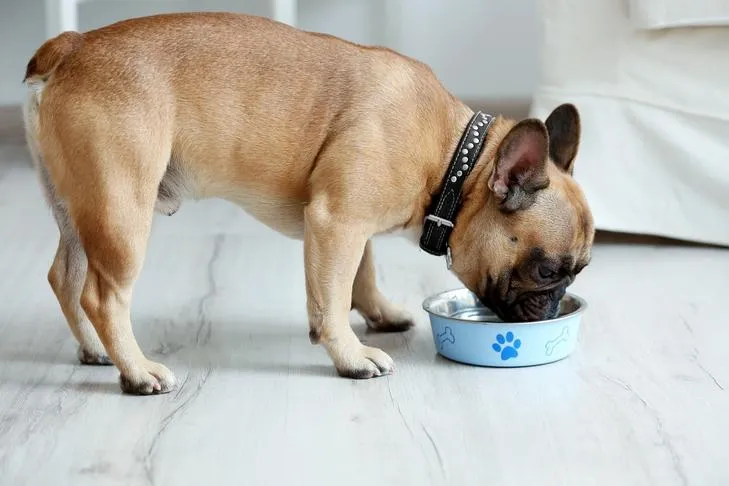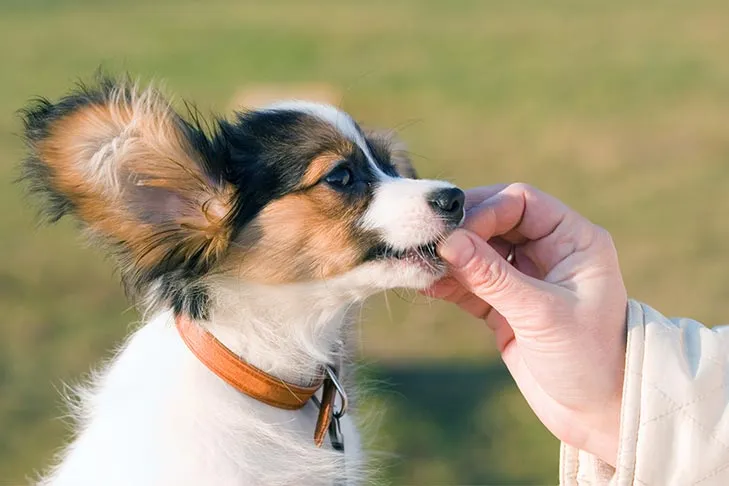As loving pet parents, we often share every aspect of our lives with our furry companions, and that sometimes includes our meals. But before you offer your dog a bite of your dinner, it’s crucial to understand which human foods are safe for them and which can be harmful or even toxic. Providing your dog with a balanced and appropriate diet is fundamental to their long-term health and happiness. This comprehensive “What Can Dogs Eat And Not Eat List” will guide you through common human foods, helping you make informed decisions to keep your canine companion healthy and safe. Knowing the difference between a harmless treat and a dangerous snack is paramount for every dog owner.
Safe Human Foods Dogs Can Eat
Many common kitchen staples can be safely shared with your dog, provided they are prepared correctly and offered in moderation. These foods can offer nutritional benefits or simply be a delightful treat.
Bread
Small quantities of plain, unseasoned bread are generally safe for dogs. It should be free of spices and, crucially, contain no raisins, which are highly toxic to canines. While bread offers little nutritional value and can contribute to excess carbohydrates and calories, a small, occasional piece won’t cause harm. Homemade bread might be a slightly better option than store-bought varieties, which often contain preservatives, but it’s best viewed as a sparse treat rather than a dietary staple.
Cashews
Cashews can be a suitable treat for dogs in moderation. They contain beneficial nutrients such as calcium, magnesium, antioxidants, and protein. However, despite being lower in fat than some other nuts, overfeeding cashews can lead to weight gain. Always ensure cashews are unsalted and given sparingly.
Cheese
Most dogs can enjoy cheese in small to moderate amounts. Unless your dog is one of the rare few with lactose intolerance, cheese can be a high-value treat. However, many cheeses are high in fat, so opting for lower-fat varieties like cottage cheese or mozzarella is advisable. Many pet owners also provide their dogs with specialized Himalayan dog chews, made from dried cheese, as a long-lasting and satisfying option. All American Dog resting its head on the kitchen table looking at cheese.
All American Dog resting its head on the kitchen table looking at cheese.
Coconut
This exotic fruit offers potential benefits for dogs, largely due to its lauric acid content, which can help fight off bacteria and viruses. Coconut can also aid in improving bad breath and may assist in clearing up various skin conditions, including hot spots, flea allergies, and general itchy skin. Both coconut milk and coconut oil are also considered safe for canine consumption. When offering fresh coconut, always ensure the hard, fibrous outer shell is completely removed, as it can pose a choking hazard or cause internal obstruction.
Corn
Corn is a widely used ingredient found in many commercial dog foods, attesting to its safety. However, the corn cob itself is a major hazard. It is difficult for dogs to digest and can easily cause a dangerous intestinal blockage. Therefore, if you wish to share corn with your dog, always ensure it is removed from the cob. A safer, non-edible alternative for playtime could be a squeaky corn toy.
Eggs
Fully cooked eggs are an excellent source of protein for dogs and can even help soothe an upset stomach. It’s crucial to cook eggs thoroughly, as raw egg whites contain avidin, an enzyme that can interfere with biotin absorption, potentially leading to a biotin deficiency over time. Always serve plain, cooked eggs without any added seasonings.
Fish
Fish is packed with beneficial fats and amino acids, providing a healthy boost for your dog. Salmon and sardines are particularly advantageous; salmon is rich in vitamins and protein, while sardines offer easily digestible bones for extra calcium. Except for sardines, it is imperative to meticulously remove all tiny bones from other fish types, as they can splinter and cause internal injury. Always feed your dog fully cooked and cooled fish, never raw or undercooked, and limit fish intake to no more than twice a week.
Ham
While a small piece of ham won’t typically harm your dog, it’s far from the healthiest option. Ham is notoriously high in sodium and fat, which can be detrimental to a dog’s health if consumed regularly. It should be an occasional, very small treat rather than a continuous habit, especially for dogs prone to pancreatitis or weight issues.
 French Bulldog eating from a bowl at home.
French Bulldog eating from a bowl at home.
Honey
Honey is a natural powerhouse of nutrients, boasting vitamin A, potassium, calcium, magnesium, copper, and potent antioxidants. Feeding dogs small, controlled amounts of local honey has been suggested to help with environmental allergies by introducing minute amounts of local pollen to their systems, potentially building immunity. Beyond consumption, the sticky goodness of honey can also be applied topically as a natural treatment for minor burns and superficial cuts, thanks to its antibacterial properties.
Milk
Dogs can drink milk, but caution is advised. Many dogs are lactose intolerant and may experience digestive upset, such as diarrhea, after consuming dairy products. While a small amount of milk might be fine for some, owners should be vigilant for any signs of intolerance and may find it safer to stick to water for hydration. If you’re wondering what can we give dogs to eat for hydration, water is always the best choice.
Peanut Butter
Peanut butter can be an excellent source of protein for dogs, providing heart-healthy fats, vitamins B and E, and niacin. The healthiest choice is raw, unsalted peanut butter. It is absolutely critical to read labels carefully and ensure the peanut butter does not contain xylitol, a common artificial sweetener that is highly toxic and potentially fatal to dogs. For more details on safe snacks, check out what are some human foods that dogs can eat.
Peanuts
Unlike almonds, plain peanuts are safe for dogs to eat in moderation. They are rich in healthy fats and proteins that can contribute to your dog’s well-being. However, due to their fat content, overfeeding peanuts can lead to pancreatic issues, so always offer them sparingly. Importantly, avoid salted peanuts, as excessive sodium is difficult for a dog’s system to process.
Popcorn
Unsalted, unbuttered, and air-popped popcorn can be an acceptable treat for your dog in moderation. It contains riboflavin and thiamine, which promote good eye health and aid digestion, along with small amounts of iron and protein. Always ensure all kernels are fully popped before offering them to your dog, as unpopped kernels can pose a choking hazard or cause dental damage.
Pork
Pork is a highly digestible protein source for dogs, packed with essential amino acids. Although it contains more calories per pound compared to some other meats, it can be a valuable part of a dog’s diet. For some pets, pork may also be less likely to trigger an allergic reaction compared to other common proteins like chicken or beef.
Quinoa
Quinoa, a highly nutritious pseudocereal, is increasingly found in high-quality dry dog foods. Its robust nutritional profile makes it a healthy and often superior alternative to common starches like corn, wheat, and soy, which are frequently used as fillers in kibble. It provides a good source of protein, fiber, and essential minerals. Samoyed puppy laying in the grass outdoors.
Samoyed puppy laying in the grass outdoors.
Salmon
As previously mentioned, fully cooked salmon is an outstanding source of protein, healthy fats (especially omega-3 fatty acids), and amino acids. These nutrients are vital for promoting joint health, supporting brain function, and boosting a dog’s immune system. However, it is crucial to understand that raw or undercooked salmon can harbor parasites that are extremely dangerous to dogs, potentially causing severe illness known as salmon poisoning disease, which can manifest as vomiting, diarrhea, dehydration, and in extreme cases, even death. Thorough cooking effectively eliminates these parasites, making salmon safe.
Shrimp
An occasional serving of cooked shrimp is generally fine for your dog, but only if they are fully cooked and completely shelled, with the tail, head, and legs removed. Shrimp are rich in antioxidants, vitamin B-12, and phosphorus, while being low in fat, calories, and carbohydrates, making them a healthy, lean treat option.
Tuna
Dogs can consume tuna in very small, controlled amounts. When fed in moderation, cooked, fresh tuna is an excellent source of omega-3 fatty acids, which are beneficial for heart and eye health. Canned tuna, however, should be given sparingly due to its potential mercury and sodium content. If offering canned tuna, always choose varieties packed in water (not oil) and ensure it contains no added spices or flavorings. For questions like what can food can dogs eat, tuna is generally a safe option if prepared correctly.
Turkey
Plain, cooked turkey is safe for dogs. Before feeding, it’s essential to remove any excess fat and skin from the meat, as these can be difficult to digest and high in calories. Crucially, always check meticulously for bones. Poultry bones, especially when cooked, can easily splinter during digestion, leading to dangerous blockages or even internal perforations. Any turkey seasoned with excessive salt, spices, onions, or garlic should be strictly avoided. Understanding what meat dogs should not eat is vital, and highly seasoned turkey falls into the unsafe category.
Wheat or Grains
Contrary to popular belief, grains are generally perfectly acceptable and often beneficial for dogs. Dogs do not inherently need to be on a grain-free diet. In fact, grains like wheat and corn are valuable sources of protein, essential fatty acids, and dietary fiber, contributing to a healthy digestive system and overall energy. However, if your dog has a diagnosed allergy or sensitivity to specific grains, it would be best to avoid them. Always consult your veterinarian for personalized dietary recommendations based on your dog’s specific health needs.
Yogurt
Plain, unsweetened yogurt can be a perfectly acceptable and healthy snack for dogs. The active bacteria (probiotics) found in yogurt can help strengthen their digestive system. However, like milk, some dogs may have trouble digesting dairy products dueion to lactose intolerance. Always opt for plain yogurt with live and active cultures, and strictly avoid any yogurts with added sugars, artificial sweeteners (especially xylitol), or fruit flavorings.
 Papillon puppy gently taking a treat from a hand.
Papillon puppy gently taking a treat from a hand.
Dangerous Human Foods Dogs Cannot Eat
It is absolutely essential for every dog owner to be aware of which human foods are dangerous or toxic to dogs, as consuming even small amounts of some items can lead to severe illness, organ damage, or even death. Always keep these foods out of reach and consult your veterinarian immediately if you suspect your dog has ingested any of them. For specific breed considerations, such as what can french bulldogs not eat, remember that most toxic foods apply universally across all breeds.
- Chocolate: Contains theobromine, which is toxic to dogs. Dark chocolate and baking chocolate are the most dangerous. Symptoms include vomiting, diarrhea, tremors, seizures, and heart problems.
- Grapes and Raisins: Highly toxic to dogs and can cause acute kidney failure. The exact toxic substance is unknown, but even small amounts can be dangerous.
- Onions, Garlic, Chives, and Leeks: These alliums contain compounds that can damage a dog’s red blood cells, leading to anemia. Garlic is generally considered more toxic than onion. Symptoms include weakness, vomiting, breathlessness, and pale gums.
- Xylitol: A sugar substitute found in many sugar-free products (gum, candies, peanut butter, toothpaste). It causes a rapid release of insulin in dogs, leading to a sudden drop in blood sugar (hypoglycemia) and liver failure. Even tiny amounts can be fatal.
- Avocado: Contains persin, which can cause vomiting and diarrhea in dogs, though dogs are more resistant than some other animals. The pit is also a choking hazard and contains persin.
- Alcohol: Extremely toxic to dogs, affecting their central nervous system. Can cause vomiting, diarrhea, decreased coordination, central nervous system depression, tremors, difficulty breathing, coma, and even death.
- Caffeine: Found in coffee, tea, soda, energy drinks, and chocolate. Contains methylxanthines, which are dangerous to dogs and can cause restlessness, hyperactivity, vomiting, elevated heart rate, tremors, and seizures.
- Macadamia Nuts: Can cause weakness, tremors, vomiting, fever, and central nervous system depression in dogs.
- Cooked Bones: Cooked bones become brittle and can splinter, leading to choking, internal lacerations, or blockages in the digestive tract. Raw bones are generally safer but still carry risks.
- Yeast Dough: Raw yeast dough can expand in a dog’s stomach, causing painful bloating and potential stomach torsion. The fermenting yeast also produces alcohol, which can lead to alcohol poisoning.
- Fruit Pits and Seeds: Apple seeds, cherry pits, peach pits, and plum pits contain cyanide, which is toxic. The pits themselves are also choking hazards and can cause intestinal blockages.
- Mushrooms: While some mushrooms are edible, wild mushrooms can be highly toxic and cause a range of serious health problems, from liver failure to neurological damage. It’s safest to avoid all wild mushrooms.
- Rhubarb: The leaves and stems of rhubarb contain oxalates, which can cause kidney problems, tremors, and other issues.
- Nutmeg: Can cause hallucinations, tremors, and central nervous system issues in dogs.
- Citrus (stems, leaves, peels): The essential oils and psoralens in the stems, leaves, and peels of citrus fruits like lemons, limes, and grapefruits can cause gastrointestinal upset. The fleshy fruit is generally safe in small amounts, but often too acidic for dogs.
Important Considerations When Feeding Human Foods to Your Dog
Beyond the clear distinctions of safe and unsafe, there are several general guidelines to follow when introducing human foods into your dog’s diet.
Moderation is Key
Even safe foods should only be given as occasional treats and in small quantities. Human foods should never make up a significant portion of your dog’s diet, which should primarily consist of high-quality commercial dog food appropriate for their life stage. Too much of any new food can cause digestive upset.
Preparation Matters
Always serve human foods plain, without any added salt, sugar, spices, oils, butter, or sauces. These additives are often unhealthy for dogs and can even be toxic (like onion or garlic powder). Foods should be cooked thoroughly, especially meats, to eliminate bacteria and parasites. Remove all bones, seeds, pits, and hard rinds.
Be Aware of Allergies and Sensitivities
Just like humans, dogs can develop allergies or sensitivities to certain foods. Introduce new foods one at a time and in very small amounts, monitoring your dog for any adverse reactions such as vomiting, diarrhea, itching, or lethargy. If you notice any unusual symptoms, discontinue the food and consult your vet.
Consult Your Veterinarian
When in doubt, always consult your veterinarian. They can provide personalized advice based on your dog’s age, breed, weight, and any existing health conditions or dietary restrictions. This is especially important for dogs with sensitive stomachs or specific medical needs.
Always Introduce Slowly
A sudden change in diet can upset your dog’s stomach. Introduce any new human food slowly and in tiny portions over several days to allow their digestive system to adjust.
Conclusion
Understanding “what can dogs eat and not eat list” is an indispensable part of being a responsible pet owner. While it’s tempting to share your meals, prioritizing your dog’s health and safety by knowing which human foods are safe and which are toxic is paramount. Always remember that moderation, proper preparation, and vigilance are key when offering any human food. When in doubt, it’s always best to stick to high-quality dog food and vet-approved treats. By following these guidelines, you can ensure your beloved companion enjoys a healthy diet and avoids dangerous substances. For more insights into canine nutrition and care, explore other helpful articles on Dog Care Story!
References:
- American Kennel Club (AKC) – Expert Advice articles on various human foods for dogs:
- Can Dogs Eat Bread?
- Can Dogs Eat Grapes?
- Can Dogs Eat Cashews?
- Can Dogs Eat Cheese?
- Can Dogs Eat Coconut?
- Can Dogs Eat Corn?
- Can Dogs Eat Eggs?
- Can Dogs Eat Fish?
- Can Dogs Eat Ham?
- Can Dogs Eat Honey?
- Can Dogs Drink Milk?
- Can Dogs Eat Peanut Butter?
- Dangers of Xylitol
- Can Dogs Eat Peanuts?
- Can Dogs Eat Popcorn?
- Can Dogs Eat Pork?
- Can Dogs Eat Quinoa?
- Can Dogs Eat Salmon?
- Can Dogs Eat Shrimp?
- Can Dogs Eat Tuna?
- Can Dogs Eat Turkey?
- Can Dogs Eat Wheat?
- Can Dogs Eat Yogurt?
